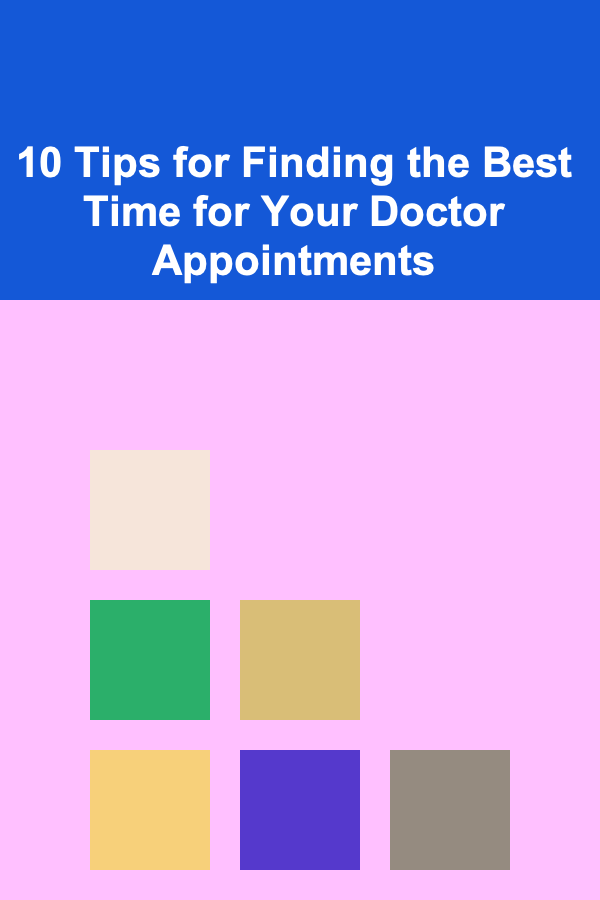
10 Tips for Finding the Best Time for Your Doctor Appointments
ebook include PDF & Audio bundle (Micro Guide)
$12.99$5.99
Limited Time Offer! Order within the next:

Scheduling a doctor's appointment might seem like a straightforward task, but there's more to it than simply picking a time that's convenient. Whether it's your primary care physician, a specialist, or a routine check-up, finding the best time for your doctor's appointments is crucial for ensuring the most effective and stress-free experience. From managing your work schedule to considering the best times for your health, it's important to find a time that allows for both convenience and optimal care.
This guide will provide you with 10 valuable tips to help you find the best time for your doctor's appointments, so you can make the most out of your visits and maintain your overall health.
Consider Your Health Condition and Needs
The timing of your appointment should be based on more than just convenience. If you have a chronic health condition or are managing symptoms, you'll want to consider when you are feeling at your best. For example:
- Morning Appointments for Energy Levels: Many people feel more energized and alert earlier in the day, which can be helpful for doctor appointments. If you're dealing with a chronic condition like arthritis, a morning appointment might help you avoid the worst of your symptoms, which tend to worsen later in the day.
- Symptom Tracking: For conditions like allergies, asthma, or digestive issues, try to track your symptoms over the course of a few days to understand when they are at their worst. This can help you choose an appointment time that allows you to communicate your symptoms more effectively.
By considering your health and energy levels, you can ensure that your doctor's appointment is scheduled at a time when you are physically and mentally prepared for the visit.
Avoid Peak Hours for Less Wait Time
We've all experienced the frustration of sitting in a waiting room for what feels like hours. Scheduling your appointment during less busy times can help you avoid this stress.
- Early Morning or Late Afternoon: Most doctors' offices tend to be busier in the middle of the day, particularly around lunch hours. If you can, try to book appointments in the early morning or late afternoon when there are fewer patients. These slots are often less crowded and can lead to shorter wait times.
- Midweek Appointments: Mondays and Fridays tend to be the busiest days for doctors, as patients may need appointments after the weekend or before the weekend begins. Opting for a midweek appointment---on a Tuesday, Wednesday, or Thursday---can help you avoid the busiest days of the week.
Booking during these off-peak hours ensures that your doctor has more time to spend with you and that your visit is more efficient, leaving you with less time spent waiting.
Align With Your Work or School Schedule
One of the most common challenges people face when scheduling doctor appointments is balancing their professional or academic commitments. Finding a time that doesn't interfere with your work or school schedule is essential, as it reduces the likelihood of rescheduling or missing an appointment altogether.
- Early Morning or Late Afternoon: If your work hours are from 9 AM to 5 PM, early morning or late afternoon appointments are ideal. A 7:30 or 8:00 AM appointment allows you to start your day without disrupting your routine, while a 4:00 or 5:00 PM appointment can be convenient for people who finish work later in the day.
- Lunch Break Appointments: If you have a flexible lunch hour or a break at work, you may be able to schedule a quick appointment during this time. This is particularly helpful for routine visits like vaccinations, blood tests, or follow-ups that don't require an extensive amount of time.
By aligning your appointment with your work or school schedule, you can avoid having to take time off or rearrange your entire day.
Opt for Less Crowded Times for Specialist Visits
Specialists, such as cardiologists, dermatologists, or orthopedic surgeons, often have longer wait times due to high demand. Finding the best time for these visits requires additional consideration.
- Non-Peak Days: Most specialists tend to be less busy on specific days, especially those with a higher volume of patients. For example, if your specialist works in a hospital or clinic setting, try to avoid booking an appointment on the day after a public holiday or major events when they may be catching up on a backlog.
- Follow-Up Times: Specialist visits may require a follow-up appointment, so you should ask for time slots that are typically less crowded. Mid-morning slots or just after lunch can be ideal.
The key is to try and schedule specialist visits during the quieter parts of the day and week to reduce wait times and ensure more focused care.
Use Online Scheduling to Your Advantage
Technology has made scheduling appointments more accessible than ever before. Many doctors' offices now offer online scheduling through their websites or patient portals, and this feature can be a valuable tool when trying to find the best time for your appointment.
- Self-Scheduling Flexibility: With online scheduling, you can view available time slots in real time, making it easier to select a time that works best for you. This eliminates the need to wait on hold or deal with receptionists during office hours.
- Notifications and Reminders: Online scheduling platforms often provide email or text reminders before your appointment, ensuring that you don't forget your visit. This can be especially helpful if you have a busy schedule and tend to forget appointments.
- Cancel and Reschedule Options: If something comes up, online platforms often provide a simple way to cancel or reschedule your appointment without having to speak with the office staff.
Using these online tools effectively allows you to manage your time better and book appointments that fit seamlessly into your schedule.
Take Into Account Family or Caregiving Obligations
If you are a caregiver for a family member, it's essential to factor in your caregiving responsibilities when scheduling doctor appointments. You may need to coordinate childcare, eldercare, or other family obligations before selecting an appointment time.
- Weekends or Evenings: Depending on your caregiving responsibilities, it might be more convenient to schedule appointments on weekends or during evening hours. Some healthcare facilities offer extended hours or weekend appointments for this reason.
- Work With the Doctor's Office: If you have a caregiver or family member who needs to accompany you, ask the office if they have flexibility with appointment times. Many doctors' offices can accommodate patients who need special arrangements or additional assistance.
By considering your caregiving duties and working with the office, you can find a time that is convenient for you and ensures that you can manage both your health and caregiving responsibilities.
Plan Ahead for Routine Appointments
For routine appointments such as annual physicals, wellness check-ups, or dental cleanings, it's best to plan ahead. These appointments are often scheduled months in advance, so it's helpful to be proactive.
- Early Scheduling: Try to schedule your routine appointments well ahead of time, especially for appointments that are hard to get into, such as eye exams, dental check-ups, or vaccinations. Many practices offer the option to book these well in advance.
- Set Reminders: Set reminders for follow-up appointments and annual check-ups to ensure that you don't forget or push them off until they become urgent. Some doctors' offices will send reminder emails, but it's always a good idea to add it to your calendar.
Routine check-ups are key for preventive care, and scheduling them ahead of time helps you avoid last-minute rushes and ensures that your health stays on track.
Consider Travel Time and Commute
When choosing an appointment time, always factor in travel time and how long it will take you to get to the doctor's office. You want to allow enough time to avoid rushing, especially if you have a busy schedule.
- Rush Hour Considerations: If you live in an area with heavy traffic, avoid scheduling appointments during peak rush hours. Morning or late afternoon rush hours can cause delays and make you late for your appointment.
- Proximity to Work or Home: If possible, choose a doctor's office that is close to your work or home to minimize commute time. Some healthcare systems may also have multiple locations, which gives you the flexibility to choose a location that is more convenient for you.
Minimizing travel stress can help you arrive at your appointment in a calm and relaxed state, leading to a more productive visit.
Confirm Your Insurance Coverage
Before you schedule your appointment, it's important to verify your insurance coverage. Some insurance plans have restrictions on when you can see certain specialists or require prior authorization for certain procedures.
- Insurance Provider Hours: Your insurance provider may have specific times during the week when they process claims more efficiently or answer customer inquiries, so it's worth checking with them.
- Know Your Co-Pay and Deductibles: Be aware of your insurance plan's co-payments, deductibles, and any potential out-of-pocket costs for visits at different times.
Confirming your insurance details in advance will prevent you from encountering any surprises when it comes to payment, ensuring that you're financially prepared for your visit.
Communicate With Your Doctor's Office
Sometimes, finding the best time for your doctor's appointment may require some communication with the office staff. They may have insights into the best times to schedule appointments based on availability and patient needs.
- Ask About Availability: Call the office or use the online system to inquire about available time slots. If you have flexibility, you might be able to choose the best time for your needs.
- Special Requests: If you need a specific time or have special scheduling concerns, don't hesitate to communicate these with the office. Many doctors are willing to accommodate patients with unique needs when possible.
Having open communication with your doctor's office ensures that you get the best time that works for both your health and personal schedule.
By following these 10 tips, you can ensure that you find the best time for your doctor's appointments. Prioritizing your health while managing your personal schedule will lead to a smoother experience, allowing you to focus on what truly matters---maintaining your well-being. Whether it's finding a quiet time that minimizes wait times, aligning with your work schedule, or ensuring the visit fits your energy levels, these strategies will help you optimize your healthcare routine and make the most of your doctor's visits.
Reading More From Our Other Websites
- [Mindful Eating Tip 101] Family Food Flow: Building Mindful Eating Routines with Your Little Ones
- [Personal Care Tips 101] How to Use Hand Cream for a Relaxing and Rejuvenating Experience
- [Home Party Planning 101] How to Plan a Home Party with a Focus on Healthy Snacks and Drinks
- [Personal Investment 101] Turning Deep Learning into a Profitable Side Hustle
- [Home Family Activity 101] How to Create a Meaningful Family Crest: A Step‑by‑Step Guide
- [Organization Tip 101] How to Reflect on Past Seasons to Improve Future Organization
- [Home Maintenance 101] How to Clean and Maintain Your Home's Chimney
- [Personal Care Tips 101] How to Apply Lip Gloss for a Natural, Shiny Finish
- [Personal Care Tips 101] How to Use Shaving Cream for a Quick, On-the-Go Shave
- [Rock Climbing Tip 101] Best Fingerboard Routines for Power‑Endurance Boost in Indoor Climbing

How to Create a Unique Guest List That Fits Your Party Style
Read More
How to Stage Your Home to Appeal to Retirees
Read More
Mock Interviews: The Key to Overcoming Interview Anxiety
Read More
How to Plan for Travel and Hobbies in Early Retirement
Read More
How to Finish Wood Furniture with a Durable Topcoat
Read More
How to Track HELOC Interest Expenses Effectively
Read MoreOther Products

How to Create a Unique Guest List That Fits Your Party Style
Read More
How to Stage Your Home to Appeal to Retirees
Read More
Mock Interviews: The Key to Overcoming Interview Anxiety
Read More
How to Plan for Travel and Hobbies in Early Retirement
Read More
How to Finish Wood Furniture with a Durable Topcoat
Read More